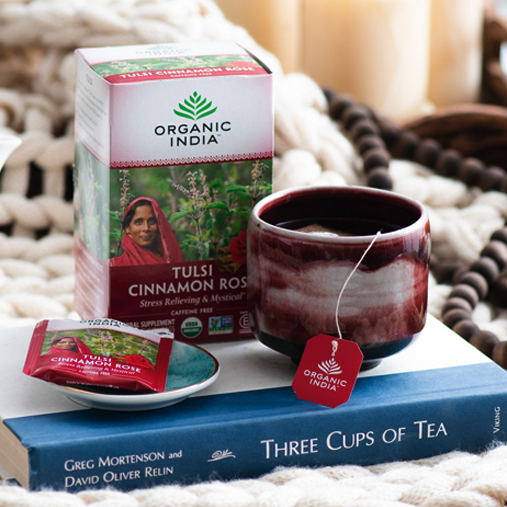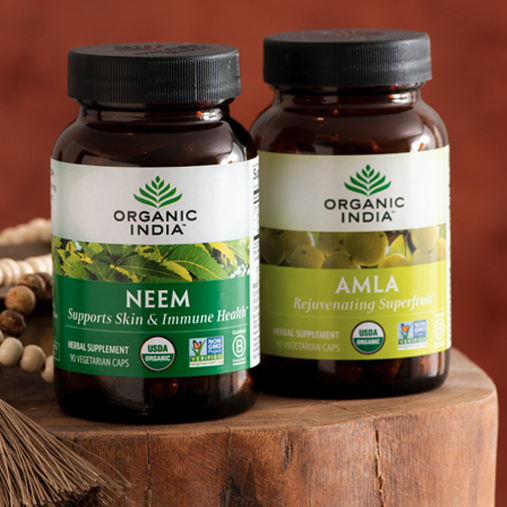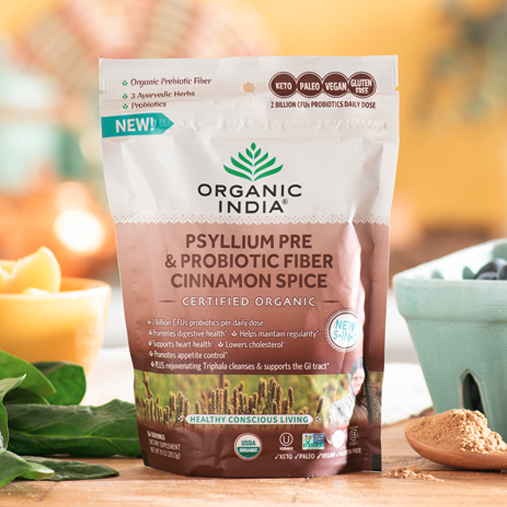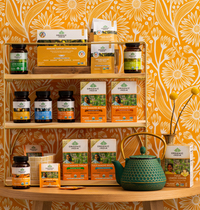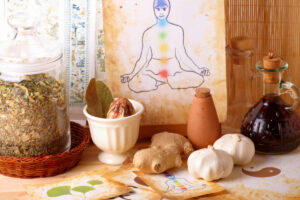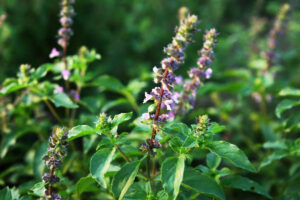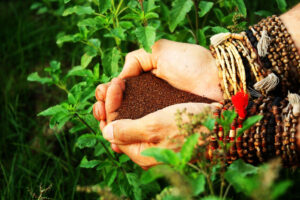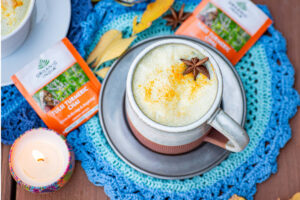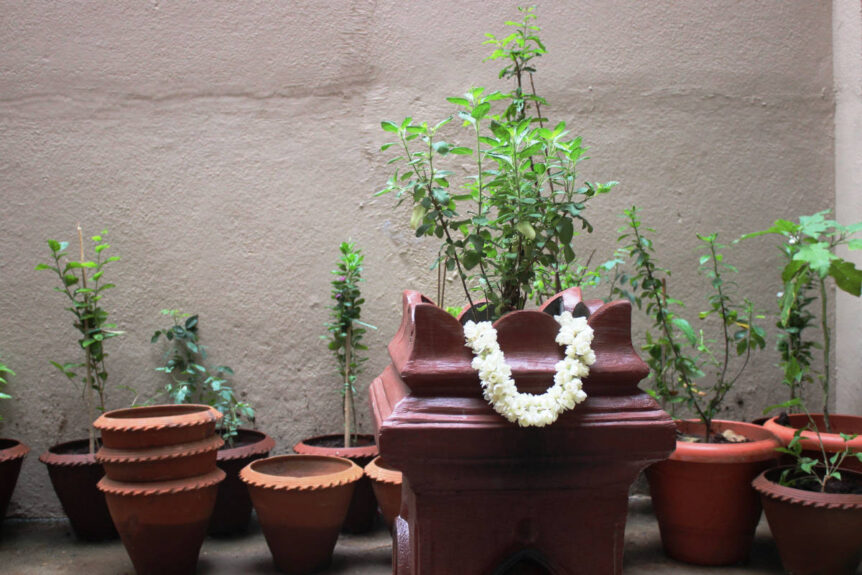Back
For millennia, people have used various symbols, objects/materials, prayers, mantras, and even herbs for protection of their homes, bodies, minds, and spirits.
Some examples include symbols like the evil eye or Italian horn; objects and materials like crystals or mirrors; prayers and mantras designed to guide or harness divine protection; or sacred herbs such as Tulsi, Neem, Chamomile, Rose, and Peppermint.
5 Herbs for Protection
Today, we’ll take a deep dive into the mystical and spiritual properties of these 5 herbs, how they were (and can be used), plus their health benefits to body and mind.
#1: Tulsi, The Incomparable One
Tulsi, also known as Holy Basil and “The Incomparable One” in Sanskrit, is a staple in many gardens and courtyards across India. Considered a sacred plant, it’s grown for its medicinal benefits and divine/spiritual protective properties.
Tulsi for spiritual protection
Tulsi has been worshiped by various cultures throughout the globe. Although it is most commonly grown in India.
It is considered a highly sattvic plant. Sattvic is a yogic term drawn from the Sanskrit word: sattva, which means bringer of clarity, light, divinity, spirituality, compassion, intelligence, and wisdom.
The ancient Vedic Bhagavata Purana text considers Tulsi as the embodiment of Lakshmi, the goddess of wealth and generosity. Thus, it is considered essential throughout many Hindu cultures to have at least one Tulsi plant on your property. It’s also used to bless and purify homes, temples, and other places of worship.
Tulsi’s mystical and spiritual properties extend beyond India. For example, it has been used in holy water, on the altars of Greek Orthodox churches throughout Europe, and is recorded to have been blooming outside the empty tomb of Christ when the disciples arrived.
Tulsi for optimal health:
Tulsi is considered a super-herb because of its wide-reaching health benefits. As an adaptogen, it helps the body adapt and strengthen itself in the presence of physical, mental, and spiritual stressors.
It’s also excellent for supporting immune function, digestion, skin health, inflammatory response, heart and kidney health.
We have barely unearthed the benefits of this mystical and powerful herb. To learn more, check out: What is Tulsi? All About Holy Basil.
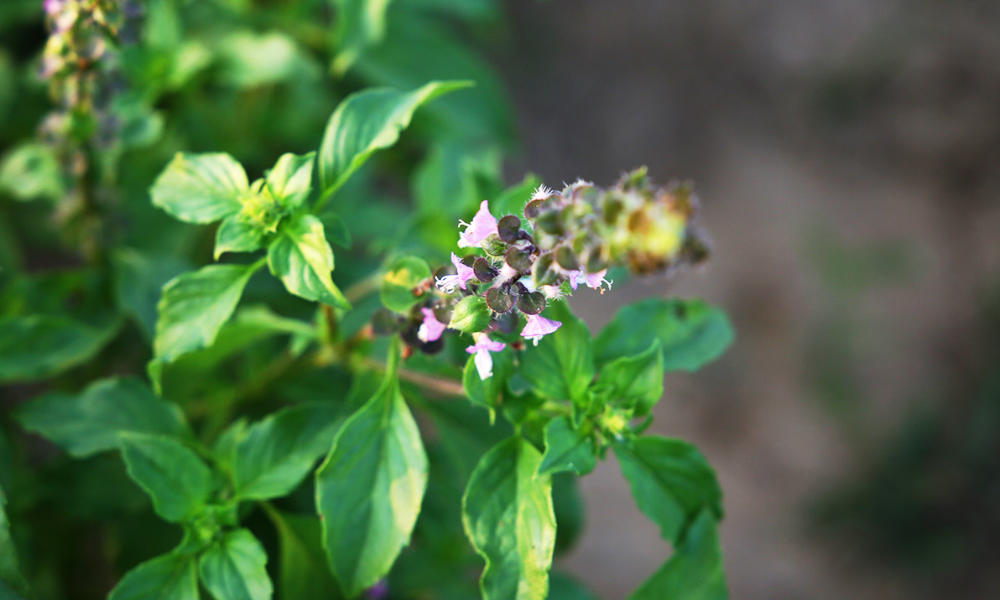
#2: Neem, The Wish Fulfilling Tree
Neem is known throughout the West for its benefits on oral health. However, this astringent plant is believed to harbor a wealth of sacred and life-giving properties.
Neem for spiritual protection
In the East, Neem is a staple in spiritual and religious rituals designed to provide protection and prosperity.
According to ancient mythology, the Neem tree was given its’ healing powers by Indra, the king of Celestials, who spilled a pot of ambrosia on a Neem tree, blessing it with the power to remove all disease.
Neem is, and has been, the catalyst of many spiritual protective rituals.
For example, dried Neem leaves are hung in the entrance of a home to ward off evil spirits. Brides would bathe in Neem leaves and newborn babies were laid on beds of Neem to provide protection, prosperity, and good health.
In some Indian cultures, it is also believed that the presence of a Neem tree on your property represents an assurance that you’ll get into heaven.
Neem for optimal health
Neem is considered one of the most powerful herbs for protection in Ayurveda for supporting good health. With many rural Indian villages still referring to it as their “local pharmacy”.
In addition to the “heaven insurance” bestowed Neem tree owners, it’s also believed to provide protection from all types of ailments.
Modern research has confirmed that Neem is excellent for supporting immunity, digestion and the health of the oral and dermal microbiomes. It’s also a natural insect repellent and supports a healthy inflammatory response.
From an Ayurvedic perspective, Neem is also used to calm and cool the liver, cleanse the blood, support the urinary tract, aid hormonal health, and to support balanced Pitta/Kapha dosha.
You can find Neem in our Neem Capsules.
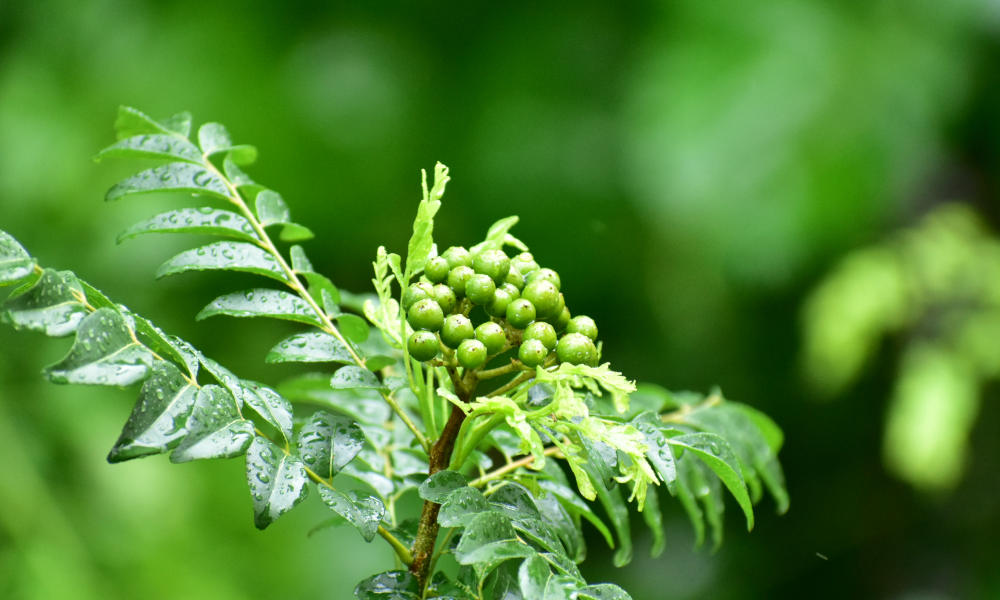
#3: Chamomile, Herb of Protection and Purification
Chamomile is most commonly known for its calming effects. However, this humble sidewalk herb has a deeply protective side…
Chamomile for protection
The use of Chamomile goes all the way back to the ancient Egyptians, who associated it with their Sun gods. It was also used by other ancient cultures for health and rituals, including the Romans, Greeks, and other Europeans.
In herbal folklore, Chamomile is known as the herb of protection and purification. It’s been used in rituals to ward off negative energy and spirits, and acts as a barrier when planted outside the home.
It’s also believed to offer strength during difficult times in life, and is ideal for deepening meditation and prayer.
In some cultures and regions, Chamomile flowers are considered a good luck charm. Which is why gamblers have been known to carry Chamomile flowers in their pockets. Likewise, Chamomile became popular in English gardens as a symbol of blessing and protection on the home.
Chamomile for optimal health
Chamomile has been shown effective in enhancing calmness, aiding healthy sleep, reducing anxiety, soothing skin irritations, and supporting overall mental and emotional well-being.
In Ayurveda, it’s used as a calming herb to support digestion, help with sleep, calm fussy or colicky babies, support immune and respiratory health, for wound healing, inflammation, mood issues, and topically for rashes and skin irritations.
You can find the soothing properties of Chamomile in our Tulsi Honey Chamomile and Tulsi Sweet Rose teas.
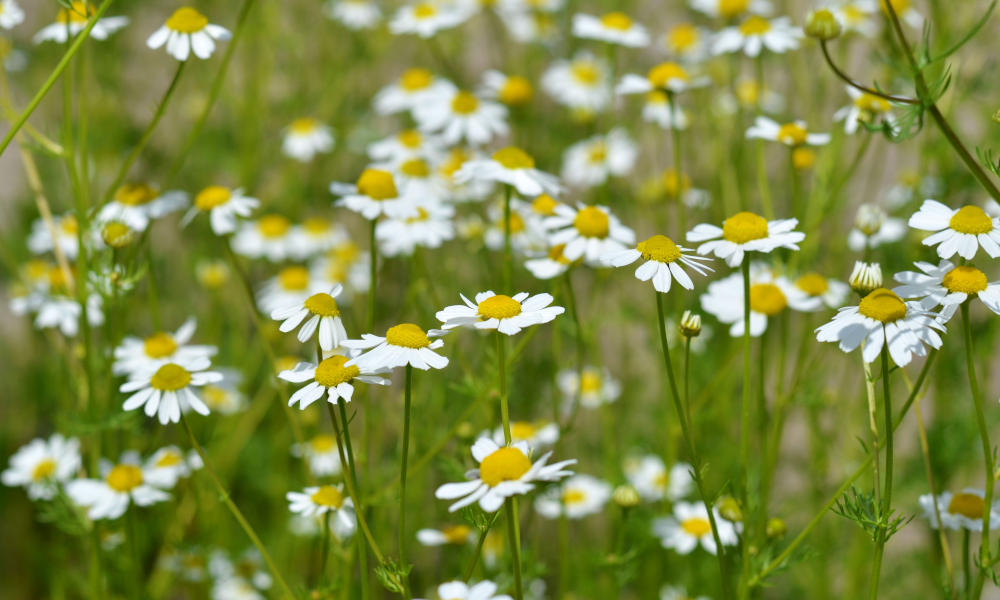
#4: Powerful Peppermint
Any herb gardener or farmer will tell you that Peppermint will take over a garden if you let it. This tendency for enthusiastic expansion is indicative of this herbs’ powerful personality.
Peppermint for protection
The scent of Peppermint is festive, familiar, and cleansing. It’s also quite strong, which is probably why it’s been used to ward off evil spirits.
A popular herb in folklore for protecting the home, it’s been grown in front yard gardens and hung over doorways and beds to provide divine protection.
Peppermint is also considered cleansing for the spirit, and an infusion of its leaves has been used as a tea for divination.
In Ayurveda, it’s used to restore a sense of wonder, inspiration, and newness, while helping facilitate the release of what no longer serves.
Peppermint for optimal health
Peppermint has been shown to have powerful antioxidant capabilities, along with additional plant compounds that support digestive health, inflammatory response, nervous system health, and respiratory function. And its essential oil has anti-microbial properties.
In Ayurveda, it’s believed to have a cooling and drying effect. Which makes it beneficial for clearing all types of stagnation, from digestive to respiratory. It’s also used topically for skin issues and to support immunity.
Peppermint’s cooling flavor pairs beautifully with floral Tulsi, in our Tulsi Peppermint tea blend.
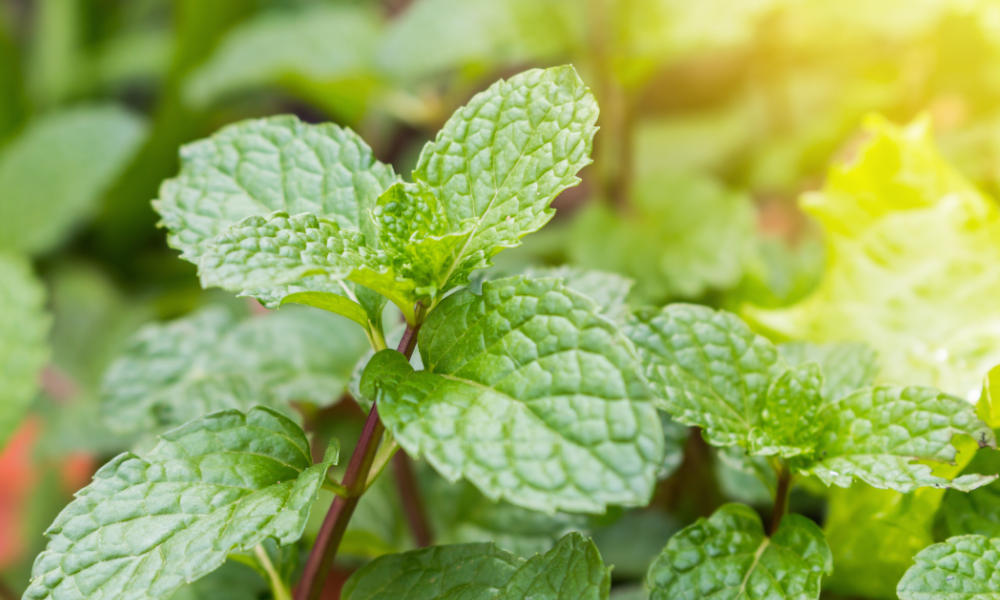
#5: Rose, The Flower of Love
Roses have long been revered for their aromatic and beauty benefits. They also have a long history of use in spiritual and religious ceremonies, and to support mental and emotional well-being.
Rose for protection
Roses are considered a high-vibration and sacred flower closely associated with the Heart Chakra and God’s love. They are also considered by some to be a symbol of aphrodite, goddess of love.
Thus, they have been used in rituals and ceremonies designed to open the heart, connect with the angels, attract love and beauty, enhance self-love, and create a loving energetic protection around a person, place, or circumstance.
It is said if you keep a Rose bush in your garden, and/or Roses by your bedroom, front door, etc., or diffuse Rose essential oil you’ll be protected and surrounded by the spirit of love.
Their aroma is considered the scent of sanctity, which is attributed to its deeply calming effect.
Throughout Europe, there have been Rose festivals dating back to the ancient Romans. To this day, Christians celebrate Pentecost at the Pantheon by dropping Rose petals through the roof.
Rose for optimal health
These days, Rose is typically taken as a tea, used in beauty products, in cooking (Rose water), or diffused as an essential oil.
No matter how you incorporate Rose into your life, its benefits are well worth the effort.
For example, Rose essential oil has been associated with enhanced calmness, improved mood, normal inflammatory response, healthier skin, and less painful menstruation in women.
Get your daily fix with our Tulsi Sweet Rose or Tulsi Cinnamon Rose Teas.
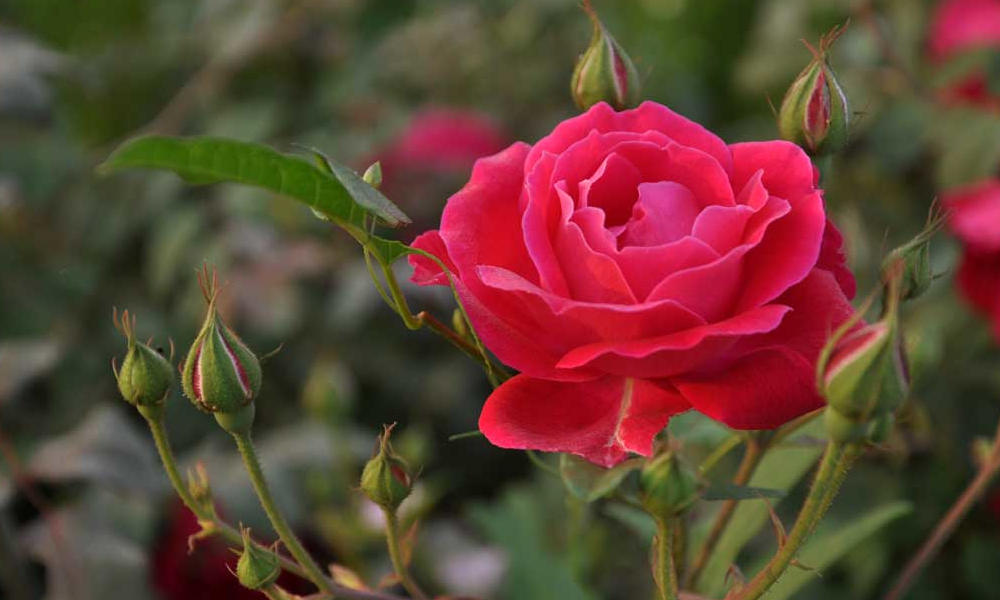
To recap
Herbs for protection have been used throughout history.
Although we now have research to back up the health-protective properties, their actions on the metaphysical or spiritual world still remain a bit mysterious.
However, the research on the health benefits of plant essential oils does reveal some of the mechanism behind the mystery.
For example, it explains how a plant could “ward off evil spirits” by helping enhance a person’s mental health. Or “repel sickness” by releasing natural antioxidant and immunoprotective properties. Or even attract a mate, by supporting healthy reproductive function via natural pheromones.
Regardless, these sacred plants have a wealth of protective properties to offer us—in ritual, in spirituality, and in promoting better health. Use them wisely!

